August 2025
Smarter Infra, Sharper Controls
This August, StackGen takes a big leap forward. From AI-powered StackBuilder to cross-project appStack sharing and carving infra out of massive TFState files, we’ve focused on making infrastructure generation, reuse, and governance easier than ever. You’ll also find drift alerts, a streamlined UI, and CLI enhancements that keep your workflows faster and more reliable. Plus, a set of important fixes to make your experience smooth as ever.
- What's New
- What's Enhanced
- What’s Fixed
- Supported Resources
What's New
StackBuilder: Infra Generation and Deployment Agent For Developers And Platform Engineers
Click to view
StackBuilder, your AI-powered assistant for simplifying Day 0 infrastructure tasks using natural language. Whether you're a platform engineer writing Terraform or a developer generating self-service environments, StackBuilder’s agentic workflows help you move faster.
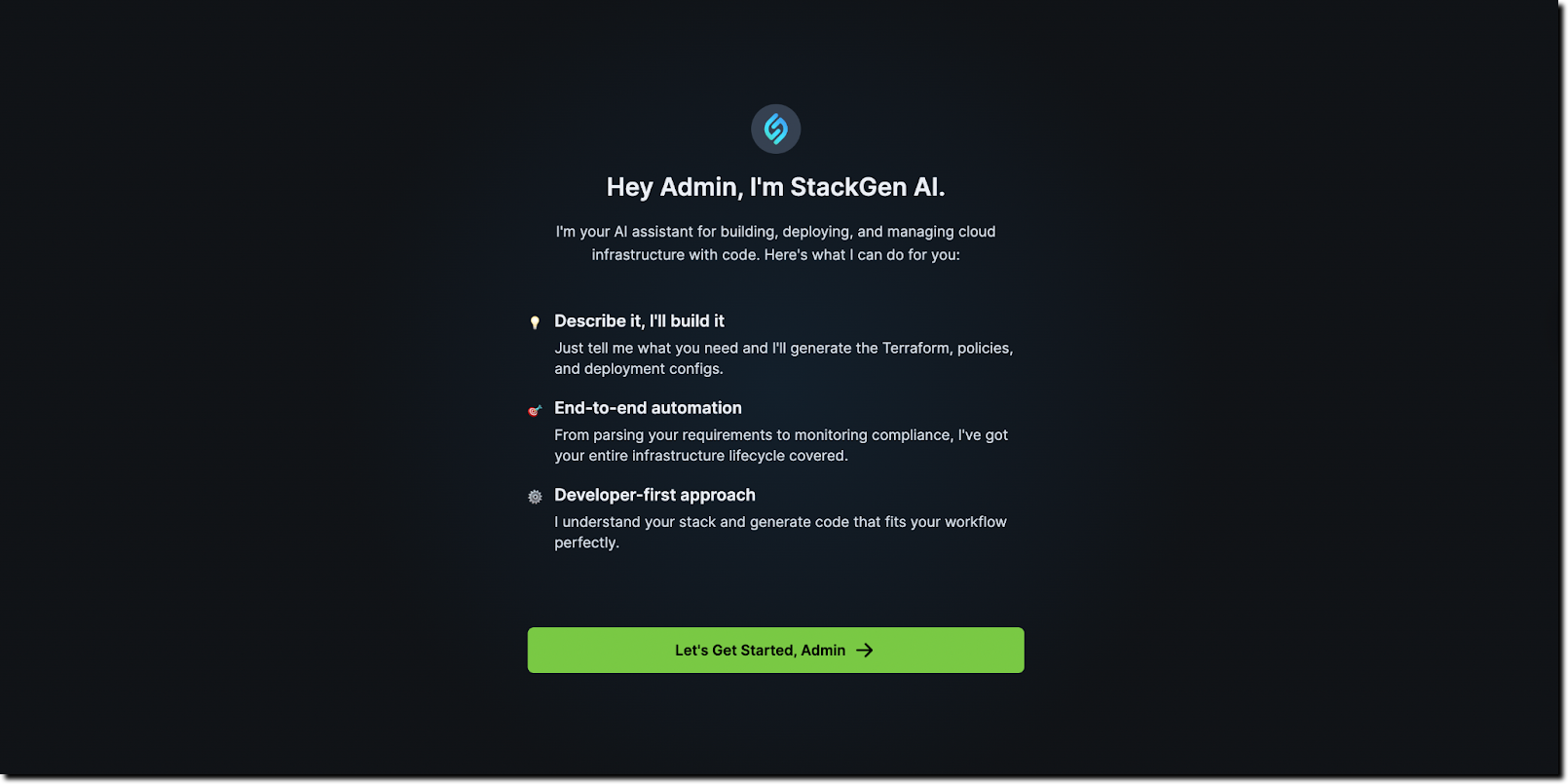
Key Features
- Day 0 (Available Now): Generate and configure Infrastructure-as-Code (IaC), set up storage, networking, variables, and more.
- Day 1 & 2 (Coming Soon): Monitoring, drift detection, incident response, and auto-remediation.
How It Works
Powered by StackGen AI agents, StackBuilder blends deterministic guardrails with generative AI to automate infrastructure tasks, so you can spend more time shipping features.
- Platform Engineers: Use the TF Module Coding Agent to generate and manage Terraform modules.
- Developers: Use the Self-Service Agent to generate governed infrastructure from natural language prompts, producing an appStack.
Getting Started
-
Navigate to StackGen > Click Assist Me > Launch StackBuilder.
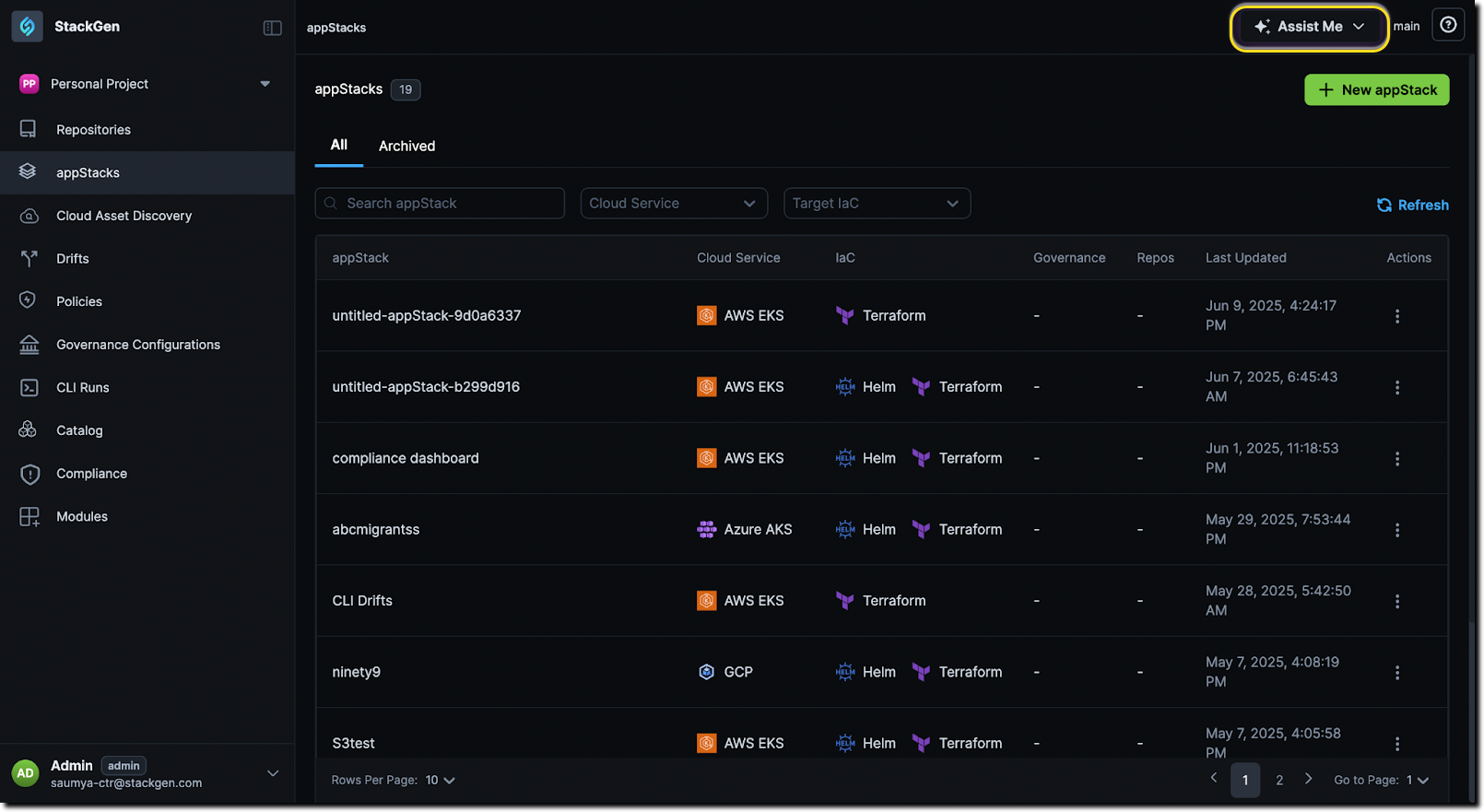
-
Use prompts like:
Generate Terraform code to deploy a typical web application backend on AWS. Include:
- A VPC with public and private subnets
- An EC2 instance (or ECS Fargate task) behind a load balancer
- RDS for PostgreSQL and ElastiCache for Redis, both in private subnets
- NAT Gateway and Internet Gateway
- IAM roles with least privilege
- Security groups for web, DB, and cache layers
- S3 bucket for static assets and logs
- Outputs for public IP, DB endpoint, and other key values
Follow AWS best practices for networking and security.
noteIf using Custom Modules, ensure they are pre-created and published in the Catalog for correct reference.
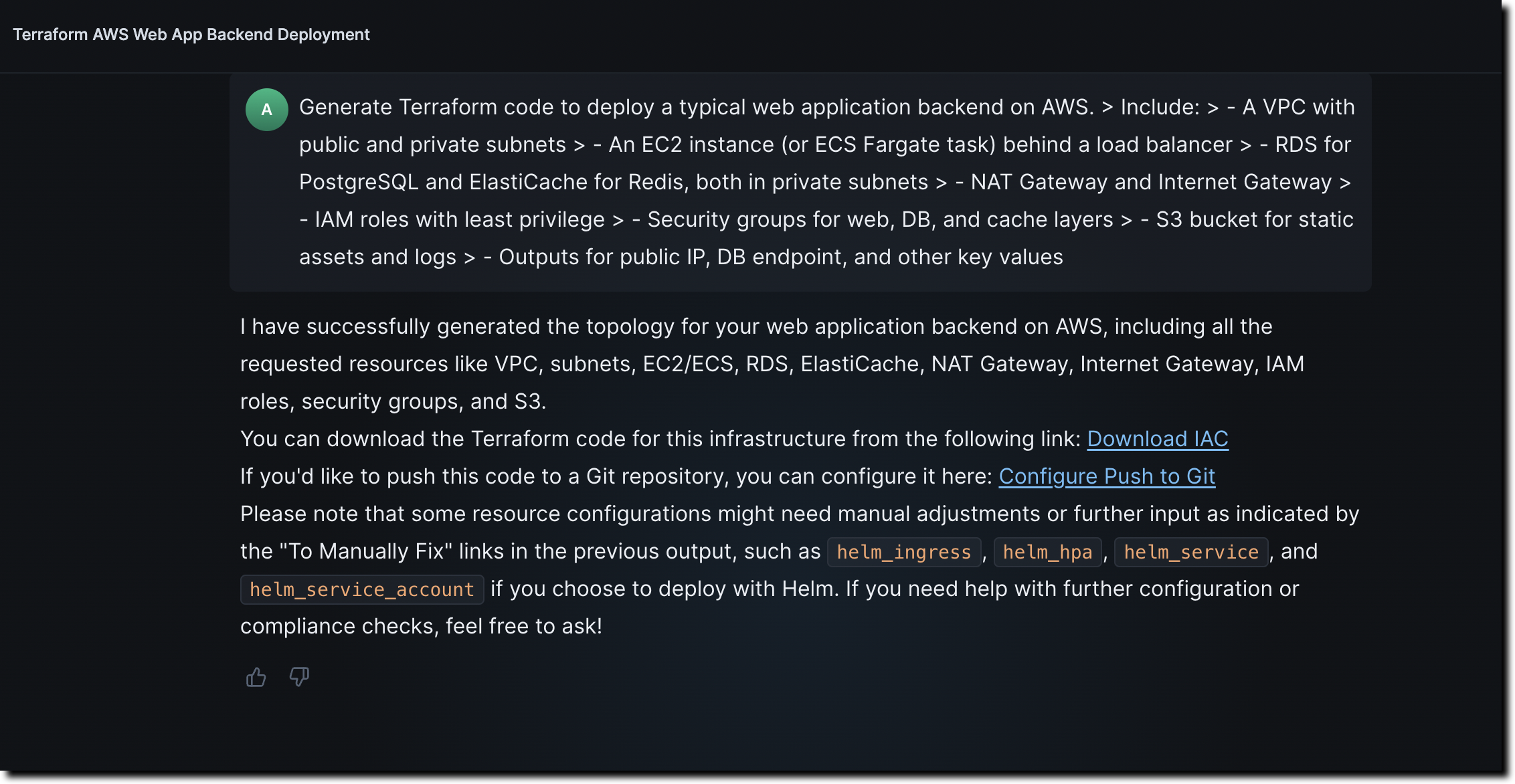
-
Configure, validate, and export your IaC—errors and policy violations are auto-detected and fixable.
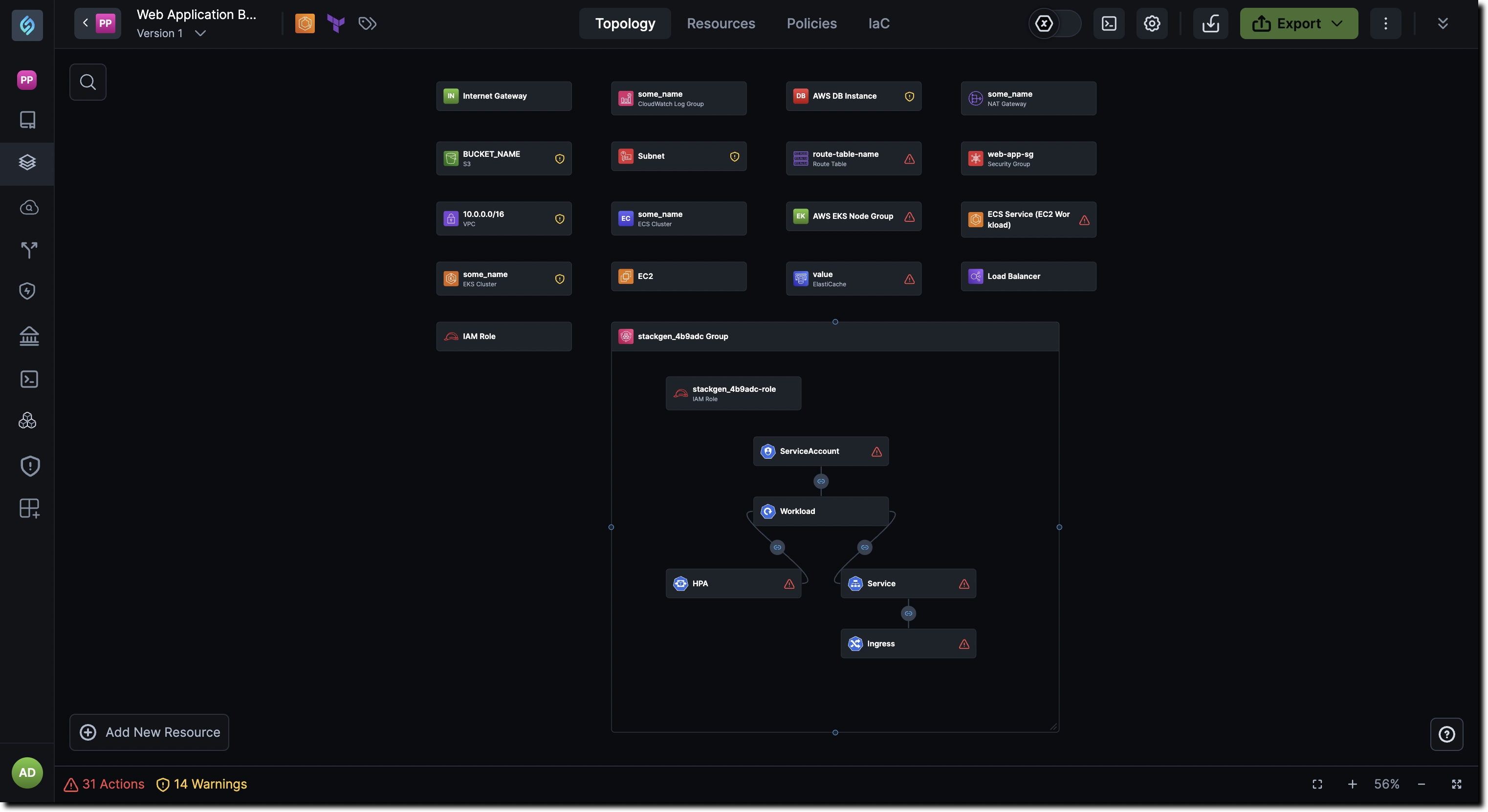
Error Handling And Governance
- Errors, policy violations, and configuration issues are detected and clearly explained.
- Manual fixes may be required—work with your DevOps team if needed.
- Governance settings are enforced: if your request violates them, the agent will either block or auto-adjust the output accordingly.
Check out StackBuilder to learn more.
Share Your Infrastructure With Set of appStacks Across Projects
Click to view
You can now share outputs from one appStack so other appStacks or projects can reuse them, ideal for separating networking, applications, or other components while keeping everything connected.
Key Features
- Cross-Project Sharing: Publish outputs (e.g., VPC IDs, Subnet IDs, Security Group IDs) from a provisioned appStack to another project.
- Automatic Updates: If the original appStack is updated, dependent appStacks automatically get the new values.
- Support for Multiple Sources: Share infrastructure from provisioned appStacks, imported tfstate files, or cloud asset discoveries with a remote backend enabled.
- Easy Integration: Use shared values directly in new appStacks without redeploying the original appStack.
This feature lets your teams work independently while reusing core infrastructure, avoiding duplication and ensuring consistency across environments.
Check out Share Infra documentation to learn how you can share your infrastructure across Projects.
Carve Out appStacks from Large TFState Imports
Click to view
Managing infrastructure as a single, giant Terraform state file can make collaboration difficult. With this release, you can now import a large .tfstate file and carve it into multiple smaller appStacks that are organized by resource family such as networking, compute, or storage.
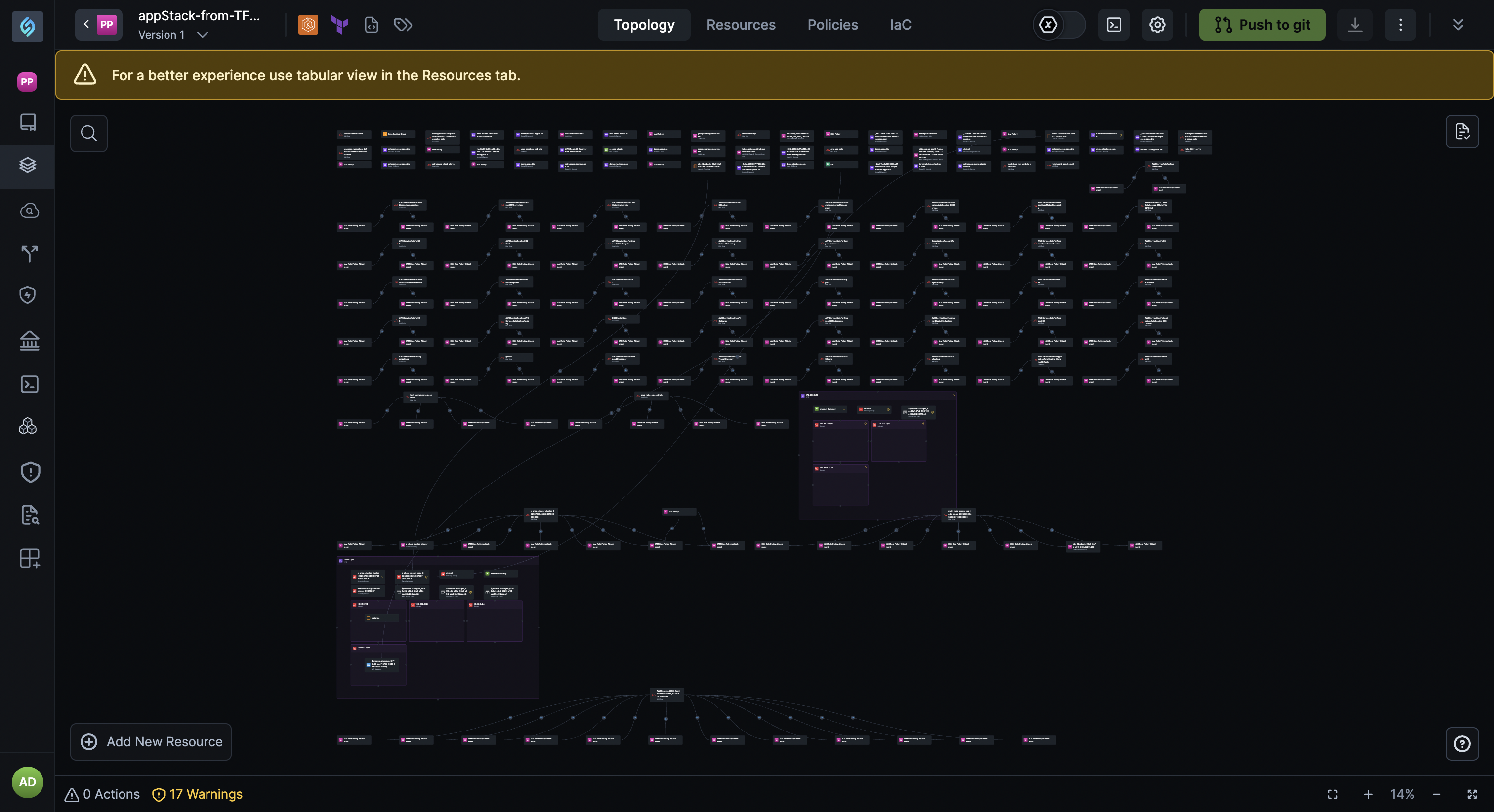
Why this matters
- Platform teams can split a monolithic infrastructure state into smaller appStacks, making it easier to assign ownership (e.g., networking to one team, storage to another).
- Zero-Drift Confidence: No matter if you start from discovery, Cloud-to-Code, or a
.tfstateimport, you can runterraform planortofu planand expect zero changes when everything is in sync. - Developer Velocity: Developers can search across existing appStacks to quickly reuse modules, reducing duplication and ensuring consistency with platform best practices.
Key Features
- Selective Imports: Choose a subset of resources from a
.tfstatefile to create targeted appStacks. - Multiple appStacks from One State: Split a monolithic state into smaller, focused appStacks (e.g., Networking, Compute, or Storage).
- Validation Across Flows: Confirm end-to-end consistency with plan, whether your appStack originates from discovery, Cloud-to-Code, or
.tfstateimport. - AI Assistance for Developers: Developers searching for best-practice modules can discover and reuse the AppStacks created for them.
Example Use Cases
- Inventory and Discovery: A platform team scans an existing production account to understand its cloud footprint, then organizes resources into appStacks by category.
- Division of Work: Teams working on a shared cloud account separate responsibilities where networking engineers own the Networking appStack, while compute engineers own Compute appStack.
- Compliance and Resilience: Using the carve-out plus module editor, platform engineers enforce compliance frameworks (FedRAMP, Mars-E) and add resiliency patterns (e.g., disaster recovery) before developers consume these appStacks.
- End-to-End Consistency: Whether starting from StackGen resources, deployed
.tfstate, or Cloud-to-Code, you can runterraform planortofu planto validate that exports match the actual deployed state.
Learn more about:
What's Enhanced
StackGen CLI
Click to view
-
StackGen CLI Version v0.67.0.: New
--appstack-idFlag for thedownload-iacCommand. We’ve added a new CLI flag to thedownload-iacCommand make it easier to retrieve your generated Infrastructure as Code (IaC) files.- The
--appstack-idflag lets you specify the UUID of the appStack you want to download. - You can use
stackgen appstack showto find UUIDs.
Learn more about
download-iac - The
-
StackGen CLI Version v0.64.3.: Default Policies are now auto-applied to appStacks that are created using StackGen CLI.
- This update fixes a known issue where appStacks created using StackGen CLI now match the UI experience by including default security policies.
- Cloud-Aware Defaults: Policies are applied automatically for AWS, GCP, and Azure appStacks.
- Flexible Control: Use
--skip-policiesflag if you prefer not to attach default policies.
Stay Ahead of Infrastructure Changes With Drift Alerts
Click to view
Drift Alerts now keep you informed whenever your infrastructure changes outside of your Infrastructure-as-Code (IaC) definitions, thus letting you respond quickly, maintain compliance, and avoid downtime.
Key Features
- Automatic Drift Detection: Continuously alerts for any changes to your deployed resources against your IaC so that you can spot unauthorized or manual changes.
- Real-Time Slack Notifications: Get instant alerts in your connected Slack channel whenever a drift is detected.
- Centralized Reporting: All drift types are tracked and reported and no manual setup is required.
With Drift Alerts, you’ll know the moment your infrastructure drifts from its intended state, so you can take corrective action before it impacts your environment.
Learn more about Drift Alerts
Streamlined UI Menu for Sharing, Importing, and Exporting IaC
Click to view
We’ve redesigned the action buttons to make your most used workflows faster and keep the interface tidy.
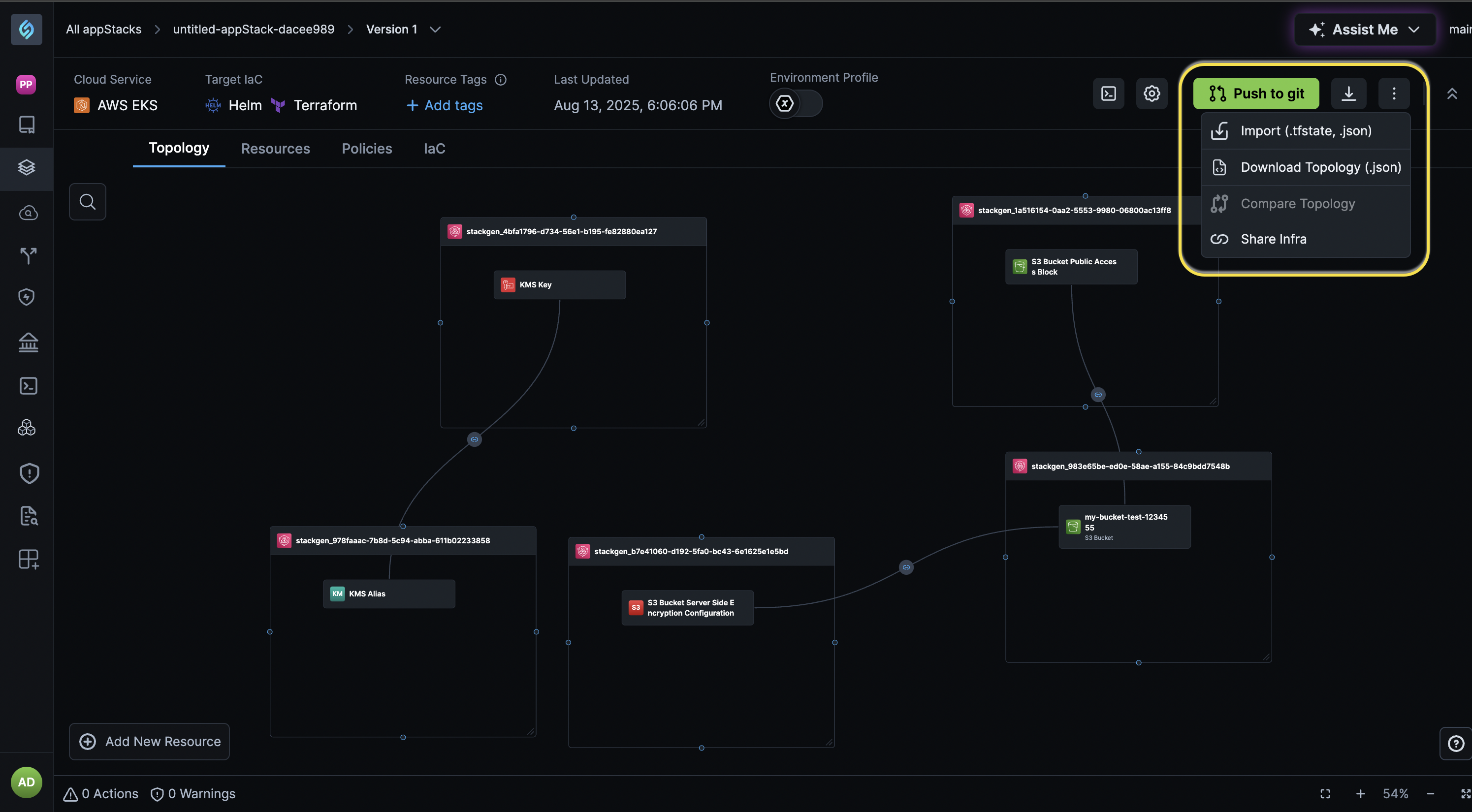
- Prominent Push to Git button: is now the primary button for quick access.
- Download IaC icon: is placed right next to Push to Git button.
- An ellipsis ⋮ icon: for more actions, such as:
- Import (
.tfstate,.json) for your IaC imports - Download Topology (
.json) to download yourtopology.jsonfile. - Compare Topology to compare the topology changes between two appStack versions.
- Share Infra to share your provisioned infrastructure across projects in StackGen.
- Import (
This update ensures sharing, importing, and exporting IaC is quicker, while keeping the workspace uncluttered.
What's Fixed
Cloud Discovery UI: Search and Filter Does Not Work On Create appStack Page
Click to view
Previously, the Search and Filter functionality on the Cloud Discovery page, only returned filtered values that were visible on the current page and missed showing results from other pages.
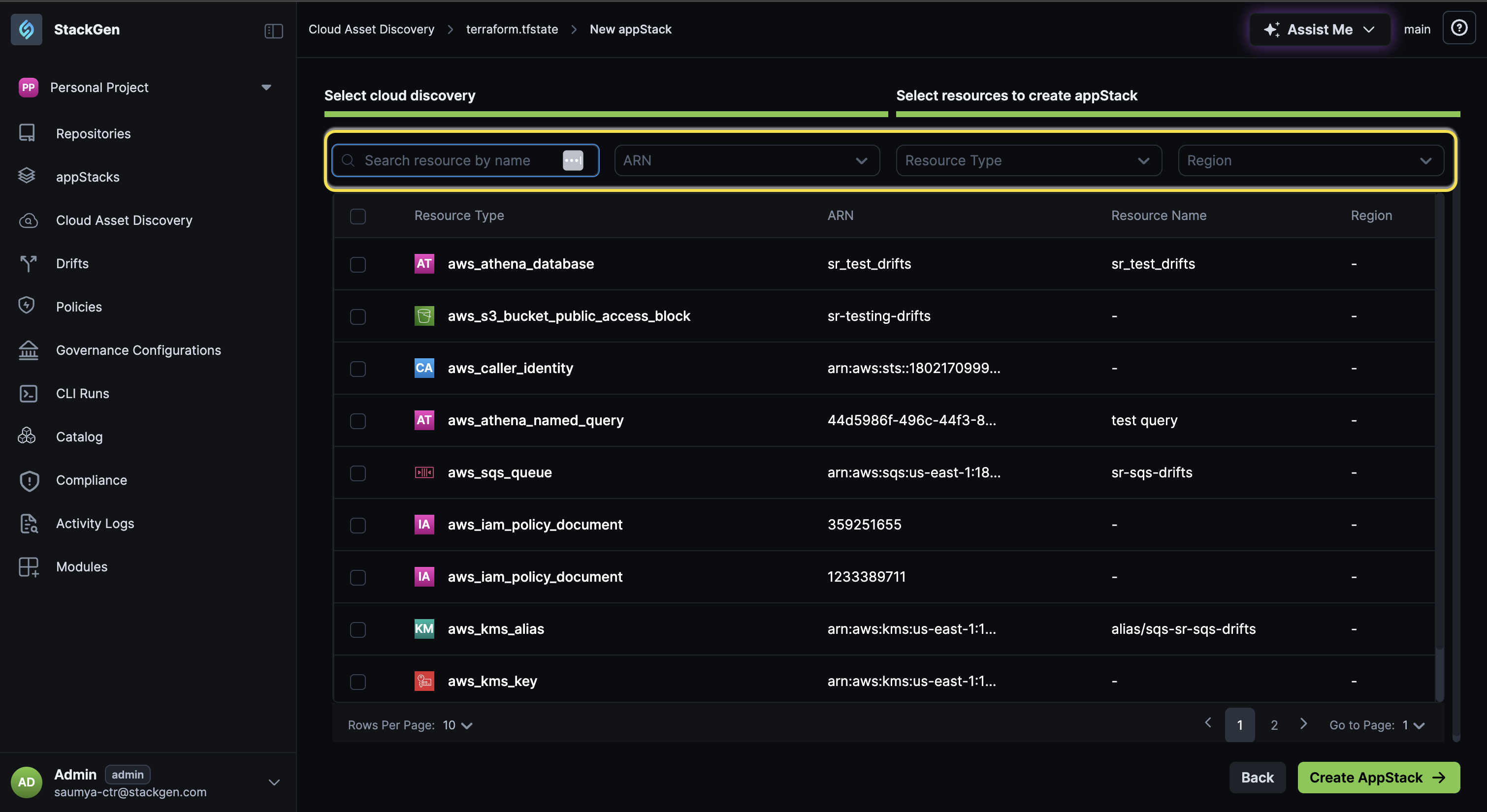
This issue has been resolved by implementing backend-driven search, filter, and pagination, ensuring that filtered results are displayed across all pages.
Resource Tags Tab Is Disabled for a Subnet Resource Until You Add Tags
Click to view
The Resource Tags UI logic now checks for the presence of a tags attribute in the resource template.
From this release onward, the Resource Tags tab will appear for any resource that defines a tags variable in its template, regardless of whether tag values are set. This removes the need to update templates solely to make the tab visible.
Previously, for resources such as Subnet, the tab remained disabled until the Add button was clicked and at least one tag was added, thereby blocking access to the tab.
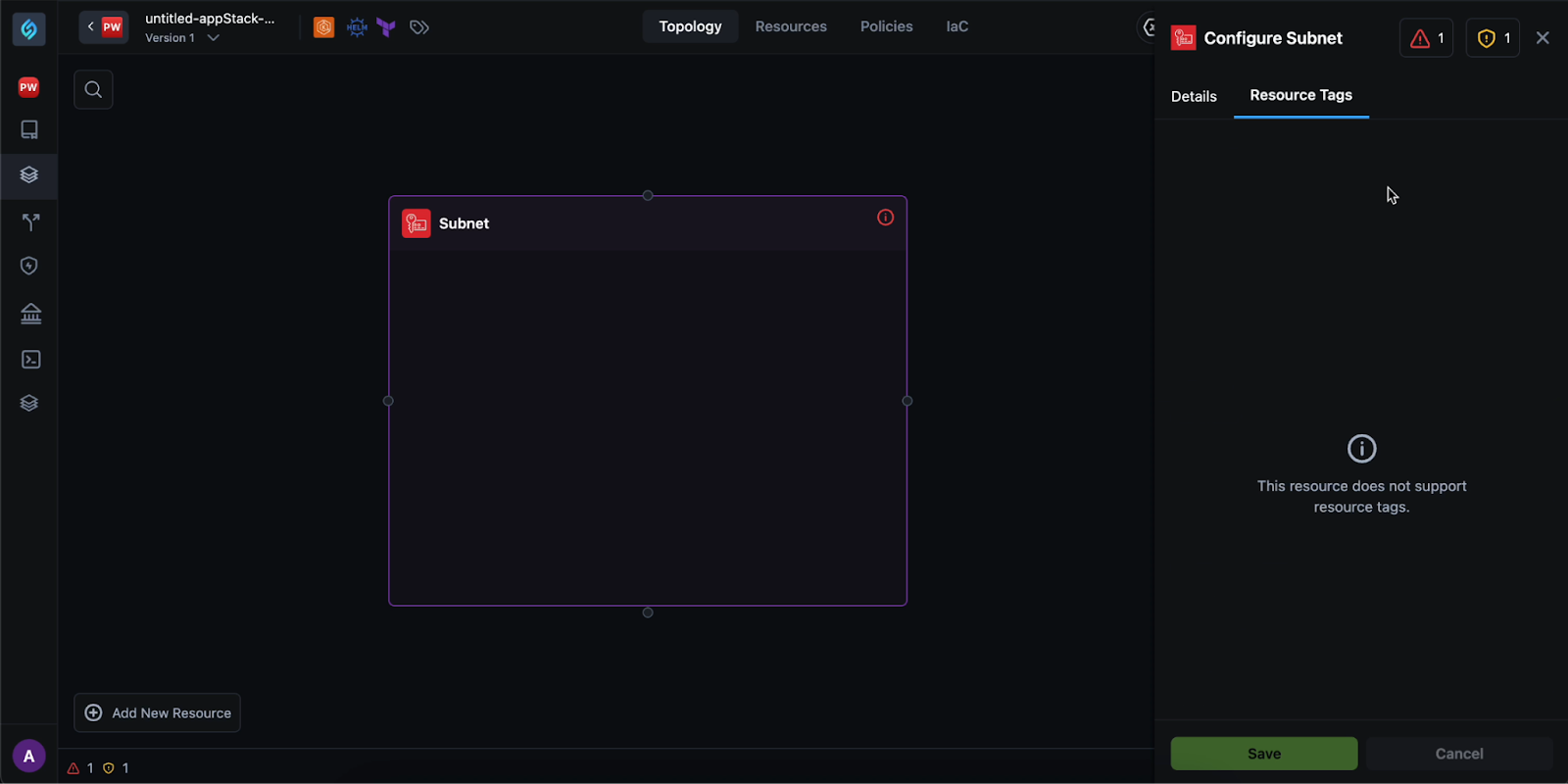
Policies Are Not Getting Added to appStacks Created via CLI
Click to view
In CLI Version v0.64.3, default policies are now automatically attached when you create an appStack via CLI using the command stackgen appstack create, unless --skip-policies is specified. We recommend that you upgrade to this version to ensure consistent behavior.
Previously, appStacks created using StackGen CLI were missing the assignment of default policies for AWS, GCP, and Azure, unlike those created via the Web UI.
Supported Resources
Click to view
With this release, we've added Kubernetes to the list of supported platforms across cloud providers. We've also added the following resource and services across the following clouds:
| Cloud Provider | Services | Resources |
|---|---|---|
| AWS | 4 | 12 |
| Azure | 3 | 9 |
| GCP | 2 | 7 |
Refer to the Supported Resources document to view the complete list.